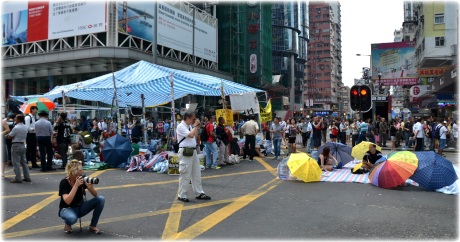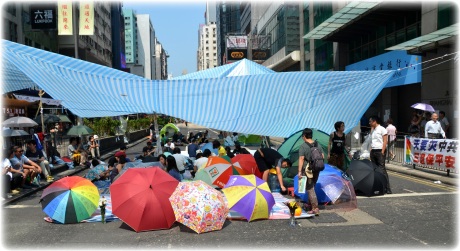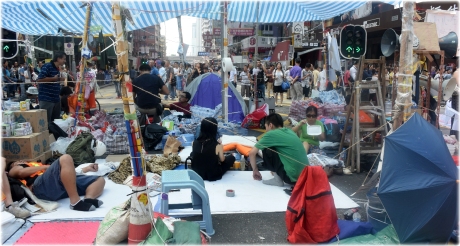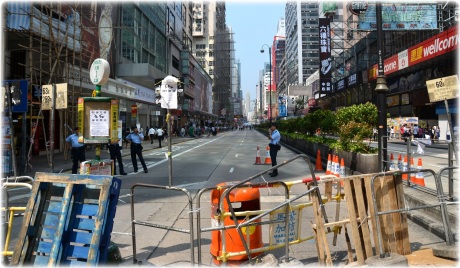One Country, Two Systems, and the Umbrella Revolution
10 October 2014
Friday
It is perhaps too soon to say that the Umbrella Revolution in Hong Kong has failed, but it can be said that the protests have now largely dispersed and the Hong Kong government has already reneged on its promises to hold substantive talks with the student leaders of the protests. The time of greatest danger to the central government in Beijing, and the puppet government it allows to rule in Hong Kong, has passed, and the protesters have had none of their demands met. The government simply had to wait, remain calm, and let the protesters get tired of protesting and go home, which they have mostly done. The government managed this feat simply by waiting and through forbearance, rather than by conducting a massacre, as some feared. Perhaps if the protesters had proved more stubborn, a massacre might have followed in due course, as at Tiananmen.
This was, of course, the unavoidable point of reference for everyone who was watching the protests from afar — and probably also for those participating, and thus putting their lives in danger: the massacre in Tiananmen Square, known in Chinese as the “June 4 Incident.” Everyone wondered of Xi Jinping, “Will he or won’t he?” If we can count it was a “win” for the central government in Beijing that the first phase of protests have passed without granting the demands of the protesters and without the violent suppression of the protests by the PLA, that is indeed to damn the central government with faint praise. And if it was the intention of the protesters to bring the attention of the world to Hong Kong, and the raise the question of whether the proclaimed Chinese policy of “one country, two systems” can work, then the protesters must be judged to have been successful.
The policy of “one country, two systems” is incorporated by the The Basic Law of the Hong Kong Special Administrative Region of the People’s Republic of China, says:
“One country, two systems” is the fundamental policy of the Chinese Government for bringing about the country’s reunification. In line with this policy, the Chinese Government has formulated a series of principles and policies regarding Hong Kong. The main point is to establish a special administrative region directly under the Central People’s Government when China resumes its sovereignty over Hong Kong. Except for national defence and foreign affairs, which are to be administered by the Central Government, the Hong Kong Special Administrative Region will exercise a high degree of autonomy; no socialist system or policies will be practiced in the Region, the original capitalist society, economic system and way of life will remain unchanged and the laws previously in force in Hong Kong will remain basically the same; Hong Kong’s status as an international financial centre and free port will be maintained; and the economic interests of Britain and other countries in Hong Kong will be taken into consideration.
And…
The rights, freedoms and duties of Hong Kong residents are prescribed in the draft in accordance with the principle of “one country, two systems” and in the light of Hong Kong’s actual situation. They include such specific provisions as protection of private ownership of property, the freedom of movement and freedom to enter or leave the Region, the right to raise a family freely and protection of private persons’ and legal entitles’ property. The draft also provides that the systems to safeguard the fundamental rights and freedoms of Hong Kong residents shall all be based on the Basic Law.
A cynical reading of this text might point out that the first sentence in the above — “One country, two systems” is the fundamental policy of the Chinese Government for bringing about the country’s reunification — speaks only to the reunification of Hong Kong with China, and once that reunification has been achieved what happens in Hong Kong is left ambiguous. The central government in Beijing could maintain that, once a transitional phase of reunification has passed, Hong Kong will be no different from the rest of China, and “one country, two systems” will be a thing of the past.
This is more or less acknowledged in the Basic Law, although on a 50 year horizon, as the Basic Law itself expires on 30 June 2047. This was a sufficiently long time horizon that immediate worries could be allayed, but it turns out the Beijing would like to narrow the interpretation of the Basic Law well before 2047 rolls around. This has been anticipated, as we find in What Will Happen to Hong Kong Kong after 2047?, “…the protections against China eroding one country, two systems even before that date are far less watertight than they appear at first sight… even in this respect, the significance of June 30, 2047 is overstated.”
A familiar talking point in regard to the recent protests in Hong Kong has been the observation that the special arrangements made for the governance of Hong Kong after its handover by the British would be temporary, but extended long enough to accommodate some transition. For optimists, China during this period would open up and become more like Hong Kong, whereas now it appears that the Chinese leadership in Beijing has no interest whatsoever in opening up China in terms of social and political reform, and the period of adjustment is there simply to give Beijing time to force Hong Kong into conformity with the mainland.
How are we to understand an international trading entrepôt to be humbled under the yoke of a skittish Beijing, more concerned with asserting its control than with enjoying the benefits that accrue through a major Port with international connections, strong rule of law, and a significant banking industry? I used “humbled” here advisedly. In order to fully understand the situation of Hong Kong it must be understood in its historical and cultural context. Mainland Chinese who come to Hong Kong as tourists tell of being shabbily treated by the people of Hong Kong, who will make no attempt to speak Mandarin. If you cannot speak Cantonese, you had better try broken English.
We should not be surprised by this. Hong Kong has been a successful, entrepreneurial, cosmopolitan, and indeed an international city. The citizens of such a city would be understandably conscious of their differentness from the un-cosmopolitan mainland Chinese who visit Hong Kong in order to see the “big city.” Any people who have been proud, successful, independent, and, of course, overbearing also in light of their position, are going to invite resentment and a thinly-concealed desire to bring them down to a level with their current condition (to paraphrase from Thucydides). And at the bottom of most communist revolutions of the twentieth century we must remember there was a harnessing of social, cultural, and economic ressentiment, the use of the masses to overthrow the privileged — the expropriation of the expropriators. While “socialism with Chinese characteristics” has by now merely become a screen for crony capitalism, the mobilization of resentment continues to be an effective strategy for the manipulation of mass man by regimes with a communist pedigree.
Neither the pride of the successful, the popular desire to humble the proud, nor the readiness of communist regimes to mobilize popular resentment should be new to anyone. There is a reason that everyone who could afford to get out of Hong Kong got out while the getting was good. A great many former Hong Kong residents moved across the Pacific to Vancouver, British Columbia, and this has resulted in a steady stream of interesting news stories as Vancouver adjusts to its massive influx of wealthy Chinese. Just recently, for example, there was a controversy over advertisements in Vancouver that appeared only in Chinese (cf. Chinese-only sign stirs language controversy in Richmond, B.C.).
But the pre-1997 exodus from Hong Kong is not likely to be followed by a further exodus after Beijing’s decision to further tighten its grip on Hong Kong. There is an economic wrinkle in the story that makes it different from historical parallels. People will not necessarily leave Hong Kong in droves, and even if mainland Chinese could escape from China by passing through Hong Kong, they are not likely to do so in droves; Hong Kong in 2014 is not Berlin in the 1950s. After the Second World War, Germans in East Germany under communist rule could escape through Berlin until the Berlin wall was erected in 1961. And while many of these refugees wanted to escape to the west for freedom, many also wanted to escape the dismal economic regime of East Germany. These forces are not in play in today’s China and Hong Kong. On the contrary, the opposite forces are in play.
Economic refugees are now traveling in the opposite direction, with expatriate Chinese who have lived in the west, and enjoyed its personal freedoms and social openness, are returning to China to start businesses. Despite Beijing’s clampdown on freedom of expression, many Chinese choose return to China (accepting with a kind of fatalism that they must access the internet through a VPN) because the economy is growing and there are, at present, great opportunities in China for the young and ambitious who are willing to work hard. The crony capitalists of Beijing will continue to thrive, along with the princelings and returned expatriates, while the rest of the world festers in China Envy, and for this reason the leadership in Beijing has a degree of impunity that other oppressive regimes can only envy.
But the Umbrella Revolution was not for nothing. If it is true that the protests in Hong Kong failed, it is equally true that “one country, two systems” has also failed — catastrophically — and that what the central government in Beijing has proved is that it can revise, abridge, or suspend any part of the Basic Law that it likes, at any time, and to any extent. In other words, the people of Hong Kong are understood to be living under the most arbitrary tyranny conceivable, and in this sense have fewer rights and freedoms than mainland Chinese. This will have consequences not only for Hong Kong and mainland China, but also for the desire of the leadership in Beijing to negotiate reunification with Taiwan (cf. China’s Long Game With Taiwan Just Got Longer by David J. Lynch).
. . . . .
. . . . .
. . . . .
. . . . .












The situation in HK worries me! http://backpackerlee.wordpress.com/2014/09/30/the-umbrella-revolution/
The situation worries me also.